

5 tips for powerful public speaking, according to TED Talk coaches. Networking. Body Language. Personal Branding. Job Search. Website. Career To-Do Checklist by Age 35. SELF-CONFIDENCE: 40-minute Confidence & Self Esteem Guide. Conquering the Fear of Public Speaking. Description Fellow Speaker, This course is meant to teach one thing - and one thing alone.

How to get over the fear of speaking in public! How to handle the anxiety that comes over when you approach the stage or stand in front of an audience. That's it. This is a focused exposition on the various techniques one can adopt to deal with stage fear effectively. The Fear of Public Speaking is real. The fear can manifest itself before getting onstage, while on stage and even during the speech. With conscious and constant practice, it is possible to overcome the fear of public speaking. Achieve More in Less Time Using SMART Goals. Description *** Download the SMART Goals Workbook provided in external resources.
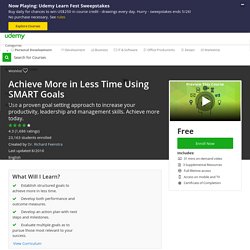
. *** Chimamanda Ngozi Adichie: 2015 Wellesley College Commencement Speaker. 11 Life Lessons Every Professional Should Know (Before It’s Too Late) 80,000 hours.
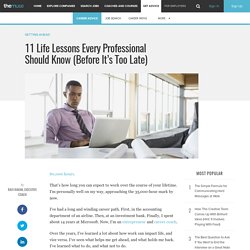
That’s how long you can expect to work over the course of your lifetime. I’m personally well on my way, approaching the 35,000-hour mark by now. I’ve had a long and winding career path. First, in the accounting department of an airline. Then, at an investment bank. How To Start Your Own Architecture Firm: 15 Tips From The Pros. Photo: Michael Hanson/The New York Times.
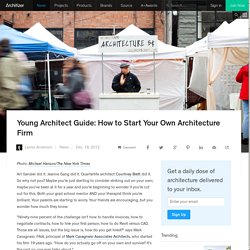
25 Great Questions to Ask University Representatives. Selecting a business school for your Masters degree is considerably easier if you know what questions to ask.

Some of your research can be done online, but interviewing B-school representatives about the specific programme you are considering, student life on the campus, and the types of career assistance offered can be quite illuminating. Most universities have personnel dedicated to assisting potential students with the decision-making process, and they make themselves accessible through a variety of ways. Beginning Your Career in Architecture: 3 Candid Pieces of Advice for Emerging Professionals. Last year Kevin J Singh, an Associate Professor of Architecture in the School of Design at Louisiana Tech University, adapted one of his lectures giving advice to students as they embark upon a new career into an article.
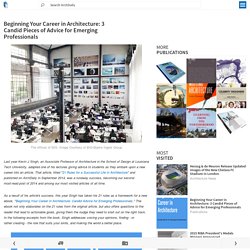
That article, titled "21 Rules for a Successful Life in Architecture" and published on ArchDaily in September 2014, was a runaway success, becoming our second most-read post of 2014 and among our most visited articles of all time. As a result of his article's success, this year Singh has taken his 21 rules as a framework for a new ebook, "Beginning Your Career in Architecture: Candid Advice for Emerging Professionals. " The ebook not only elaborates on the 21 rules from the original article, but also offers questions to the reader that lead to actionable goals, giving them the nudge they need to start out on the right track. 8 Excel Shortcuts to Help You Succeed at Work — The Muse.
Ever find yourself with a case of Excel envy?
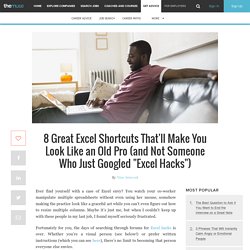
You watch your co-worker manipulate multiple spreadsheets without even using her mouse, somehow making the practice look like a graceful act while you can’t even figure out how to resize multiple columns. Maybe it’s just me, but when I couldn’t keep up with these people in my last job, I found myself seriously frustrated. Fortunately for you, the days of searching through forums for Excel hacks is over. Whether you’re a visual person (see below!) Or prefer written instructions (which you can see here), there’s no limit to becoming that person everyone else envies. 10 Executive Tips on How to Make a Lasting First Impression. Whether it's a sales call, an interview, or chance meeting with someone you may want to know better, there are things you can do to leave a positive and lasting impression.
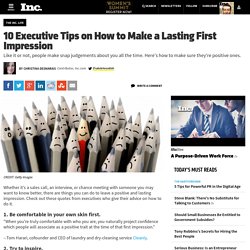
Check out these quotes from executives who give their advice on how to do it. 1. Be comfortable in your own skin first. "When you're truly comfortable with who you are, you naturally project confidence which people will associate as a positive trait at the time of that first impression. " --Tom Harari, cofounder and CEO of laundry and dry-cleaning service Cleanly. 35 things you should do for your career by the time you turn 35. We’re all for flexibility.
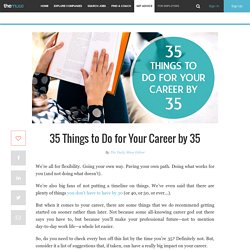
Going your own way. Paving your own path. Doing what works for you (and not doing what doesn’t). We’re also big fans of not putting a timeline on things. 9 lecciones para enfrentar la Arquitectura tras salir de la universidad. 9 lecciones para enfrentar la Arquitectura tras salir de la universidad De esto ya hemos hablado.
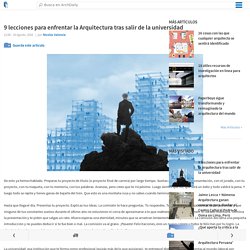
Preparas tu proyecto de título (o proyecto final de carrera) por largo tiempo. Sueñas mil veces con la presentación, con el jurado, con tu proyecto, con tu maqueta, con tu memoria, con tus palabras. 20 Brutal Truths All 20-Somethings Need to Hear. How to Think About Your Career. Young Architect Guide: 7 Secrets to Getting Hired After Graduation. How to Ask for a Professional Reference on Email. After scouring the web for the perfect job, tailoring your resume and cover letter accordingly, and perfecting the (multi-stage, mind you) interview process, submitting a list of your references seems like an almost-too-easy step: List three names, slap on their contact info, and shoot it all over to the hiring manager, right? Not so fast. Remember, even if you’ve aced all the other steps in the process, this one still really matters. An enthusiastic reference can be your ticket to a great offer; a lackluster, even mediocre, one can be the reason another candidate gets the job.
And the difference between the former and the latter depends a lot on what you do. The first step is choosing the right references, which you can read all about in Muse Master Coach Jenny Foss’ article, “Your Guide to Picking and Getting the Best Possible References.” The second step is asking them nicely—and strategically. 10 Words Smart People Always Use (and 7 They Never Do) The real reasons you procrastinate — and how to stop. iStock Have you ever sat down to complete an important task — and then suddenly discovered you were up loading the dishwasher or engrossed in the Wikipedia entry about Chernobyl? Or perhaps you suddenly realize that the dog needs to be fed, emails need to be answered, your ceiling fan needs dusting — or maybe you should go ahead and have lunch, even though it’s only 11 a.m.? Next thing you know, it’s the end of the day and your important task remains unfinished.
For many people, procrastination is a strong and mysterious force that keeps them from completing the most urgent and important tasks in their lives with the same strength as when you try to bring like poles of a magnet together. It's also a potentially dangerous force, causing victims to fail out of school, perform poorly at work, put off medical treatment or delay saving for retirement. Tips for LinkedIn (Video) In the past couple of years, LinkedIn’s truly become a job hunter’s go-to social media platform (sorry, Instagram). In fact, Muse writer Alex Honeysett says, “If you’re looking to build your personal brand—and, I'd argue, if you want to be taken seriously in the professional arena—you must be on LinkedIn.” It’s become a great way to get noticed in your field without having to be out networking every night. 7 Small Routine Changes That'll Have a Huge Impact on Your Life.
The way I think about personal development and designing the life I want to live is very similar to the way I think about investing. Imagine that every choice you make in life is associated to a “bucket.” Brushing your teeth goes in the “personal hygiene bucket.” Working on your novel goes in the “writing” or “creativity” bucket. Going to the gym goes in the “health” bucket. And so you have these five or six or 10 primary buckets that make up how you live your life: work, creativity, health, sleep, social life, family, and so on. 7 Microsoft Excel Tips for Work. 12 Powerful Habits I Have Stolen from Ultra Successful People. How to Build Exceptional Relationships: 9 Traits of Your Favorite People. 10 Signs You're Going to Be Successful—No Matter Where You End Up. A recent international study surveyed more than 500 business leaders and asked them what sets great employees apart. The researchers wanted to know why some people are more successful than others at work, and the answers were surprising: Leaders chose “personality” as the leading reason.
Notably, 78% of leaders said personality sets great employees apart, more than cultural fit (53%) and even an employee’s skills (39%). 99 Sites That Every Professional Should Know About and Use.